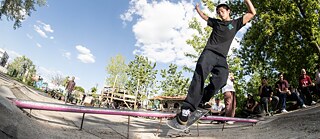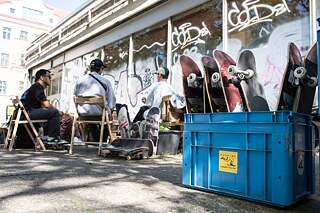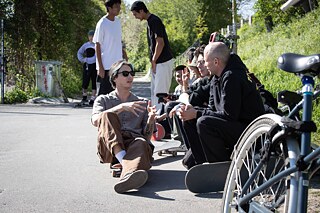Skate Diplomacy
Thailand

“Four wheels, two axles, one board. Skateboards are so simple, yet so versatile. They’re a means of transport, piece of sports equipment, creative development tool and symbol of lived freedom. And, above all, at the end of the day, skateboards are there for all. Where a seven-layered wooden board brings people together, their background, age, gender, creed and income don’t matter. What matters is their shared enjoyment of moving.” That’s how the social media channel of the German Embassy in Bangkok sums up the idea underlying the “Skate Diplomacy” tour of Germany for six skateboarders from Thailand.
Skateboarding culture in Germany can look back on 50 years of vibrant development. The skateboard scene in Thailand is still relatively young, but impressive. Pioneering work is being done, largely by skateboarders themselves, to build skate parks, form professional teams and establish skateboarding schools for the first time. Skateboarding in Thailand experienced a real boom during the COVID-19 pandemic, when many activities moved outdoors. Since then, skateboarding in Thailand has become a popular, low-threshold sport, both among urban students and young people and schoolchildren in a number of provinces. It is equally accessible to boys and girls and promotes tolerance.

Fall down, get up, carry on
“We wouldn’t call it social work. We just provide the space,” says Simon Pellaux, co-founder of Preduce Skateboards and Manager of the Preduce Skate Park in Bangkok. Don’t underestimate your influence, replies Oliver Percovich, founder of Skateistan, an NGO and skateboarding school that brings together children from different social backgrounds in Afghanistan.The two men met at a skateboarding event years ago and are exchanging ideas about fund-raising and skateboarding as a means of empowering disadvantaged children and young people. How do they involve concerned families and parents, especially of girls, in Afghanistan? This question is also one of great interest to skateboarders from Thailand.
Many clubs and non-profit initiatives harness the educational power of skateboarding summed up in the motto “Try it out, fall down, get up, try again.” One of them is skate-aid-international, an association set up by veteran skateboarder Titus Dittmann, which has been providing extensive welfare services for children and young people around the world since 2009. Tobias Egelkamp of skate-aid-international gives the guests from Thailand helpful and very practical tips. For example, that a network can be very effectively extended through school projects. “Networking is everything“.
The subject of public funding for skateboarding as a form of youth work is particularly interesting for the Thai skateboarders. “Knowing that skateboarding receives official support as youth work in Germany, for example from municipalities, helps me approach the relevant authorities in Thailand in a very different way,” says Geng Jakkarin Petchvoraphon, a professional skateboarder and founder of skatemate.co, a company that produces and sets up ramps and other skate park components.

A universal language
The clatter of skateboards, the sound of wheels on asphalt, trying out new tricks together – no matter where you are, skateboarding is a universal language. For skateboarders from Thailand, it is enlightening to discover that the skateboarding community in Germany is occupied with similar issues and questions, such as how to build good relations with neighbours around skateboarding parks, how to position oneself on the question of skateboarding and the Olympic Games, that is to say, competition and top-level sport on the one hand as opposed to an attitude to life and passion on the other.The Skate Diplomacy tour also received positive feedback from the German dialogue partners. They said it was cool that the Federal Foreign Office had initiated this tour and that the Goethe-Institut had implemented it. According to Matthias Weiland from Mister Wilson in Kassel, Germany’s second-oldest skateboard association, this interest helps the associations enormously in advocating their youth work even more self-confidently vis-à-vis official agencies and also vis-à-vis neighbours. He said it was very inspiring to see the power of skateboarding in enabling children and young people to learn to be tolerant and to interact, transcending their cultural, social and religious backgrounds. She will definitely keep in touch, said Thailand’s first professional woman skateboarder Orapan Tongkong, and has picked up lots of ideas, for example for a skateboarding project in an orphanage in her home region in north-eastern Thailand.
The participants’ unanimous verdict: sequel desired!!
Information tour “Thai German Skate Diplomacy“ at the invitation of the Federal Foreign Office
Cities visited: Berlin; Kassel
Date of travel: May 2023